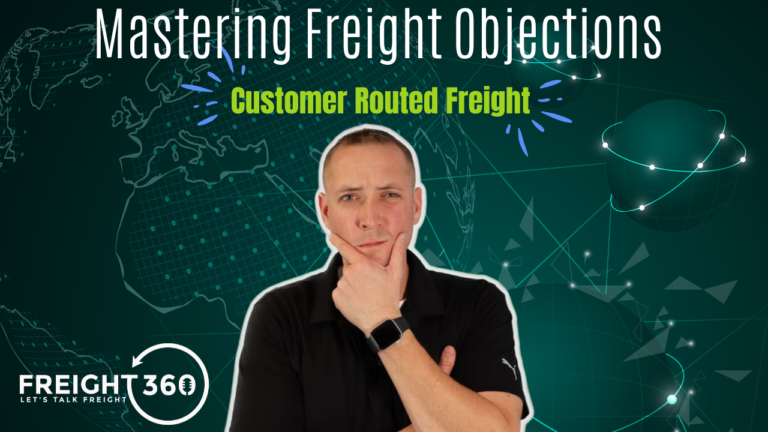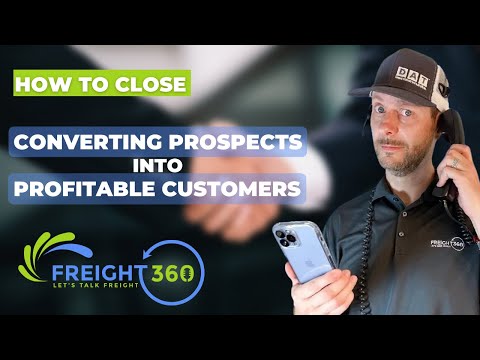How do freight brokers get loads? We’re asked this question a lot, because without loads a freight broker can’t earn a living. Let’s start by dispelling a common myth out there. There is no such thing as a load board for freight brokers full of freight that you can pick from like there is for carriers with DAT and Truckstop. There is not a similar marketplace or product for freight brokers. The most effective way to acquire loads is the old fashion way, by building relationships. If you’re looking for tips on how to find the shippers and generate leads to contact, check out our video below:
YouTube Video – How to Find Shippers
Freight Brokering vs. Other Sales Jobs
The most common way freight brokers begin their career is by doing a lot of lead generation and making a ton of cold calls. Remember that freight brokerage is much different than other types of sales out there. Most shippers you’ll be prospecting are already working with not one broker, but multiple brokers. In other sales, like automotive, mortgage, insurance or even real estate, everytime you need to make a sale, you need to find another prospect to close. In transportation, you’re working to establish enough trust through the sales process for them to consider adding you to their roster, not necessarily replace anyone. That’s an advantage and a disadvantage.
The Advantages of our Industry
First the advantage. When you’re working to get either more loads or your first load, the “sale” isn’t convincing someone to do anything they weren’t already going to move forward with. They have a load, it needs to be moved, and someone will move it. The only question is, who do they trust enough to get it moved at a fair rate on a specific date. The advantage is that we only need them to trust us enough to give us a shot with one load. We don’t need them to take a risk by getting rid of their existing relationships; just add us to them. We also don’t need to convince them to purchase anything. We need them to believe that we will follow through with our commitment.
The second advantage is that once you’ve moved a load for a shipper, if you did a good job, picked it up on time, delivered it on time, communicated properly and timely, you’ll likely get another, and another, and another, and so on. It’s the best part about the industry. You don’t need a new customer every time you need more loads to move. Now, you should be working to get more customers regardless. But, it’s not a 1-to-1 ratio like other industries.
The Disadvantage of our Industry
The disadvantage is that you’ll need to build enough trust and then establish enough value for them to work with you in the first place. That’s the biggest hurdle you’ll need to overcome to get loads. Why should they work with you when they have other brokers with access to the same trucks? And, that’s exactly what you’ll hear. The reality is, not every broker is created equal with their resources and service. So, you’ll need to prepare before you get on the phone with a few things.
First, you should understand your value proposition as a brokerage. Do you specialize in the freight the prospect has? Do you have a carrier base ideally located near their locations? Do you have drivers looking for backhauls out of their area? Are you selling on communication? Are you positioning yourself as having fantastic follow-up and follow through? Does another one of your customers deliver to the prospects location? This is by no means a comprehensive list. But, it’ll get your thoughts started.
What Not To Do
What it shouldn’t be is, “We can handle everything you need…we do everything from LTL to FTL to heavy haul.” This may be true, and it may have worked occasionally in the past. But, the truth is, it’s the most common approach new brokers take in getting loads. They feel that since they are licensed and able to handle any type of freight, why not sell yourself that way? It’s a valid question.
The reason the “we can be everything to everyone” approach isn’t typically effective, even if you’re at a large brokerage that provides all of these things well, is because it doesn’t make the prospect feel you’re uniquely capable of handling their specific needs. Think jack of all trades but a master of none. You didn’t differentiate yourself from the dozens of other calls they got this week.
Finding Your Specialty
Here’s a great tip if you haven’t determined what your competitive advantage is yet, especially if you’re new enough that you don’t have any customers yet. Ask questions, lots of them. Based on what you’re hearing, gear your advantage to a need the prospect expresses. Again, what’s important to the prospect is where your energy should go. What’s important to you won’t necessarily matter to them, but what’s important to them needs to be important to you. For more on sales, prospecting, and growing your freight brokerage, you can check out our entire library of content in the resources section of our website.





